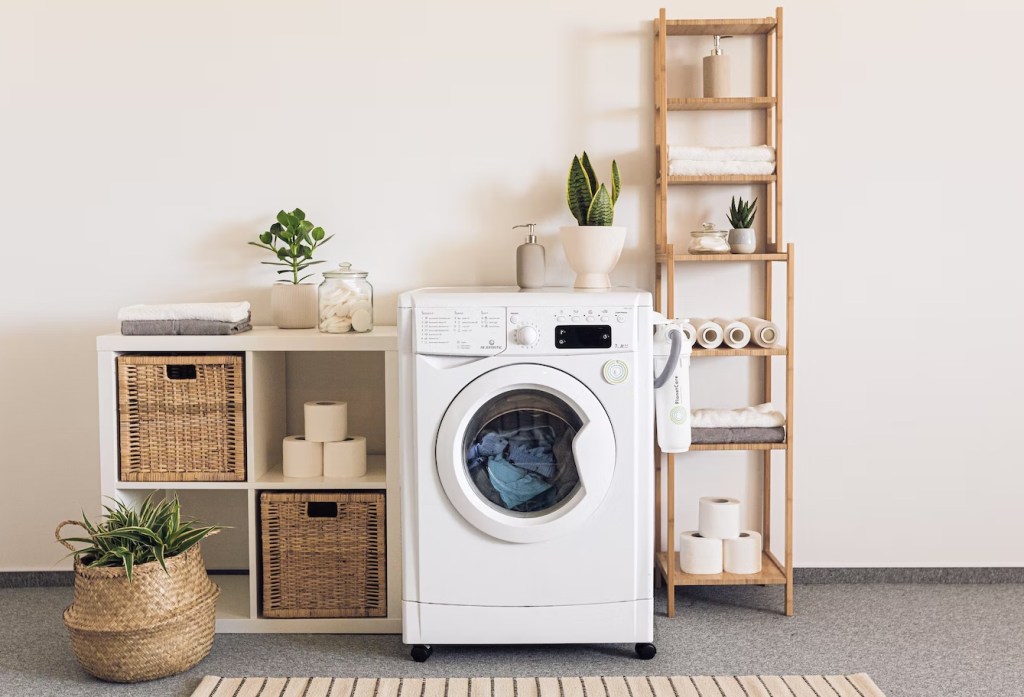In an article posted by Earth911 they were sharing a study done on the lifetime of some of the most common household appliances and electronics. The report shows how items are breaking down faster, not being utilized as long as they could, and the significance of this as a negative environmental impact on the planet. Some quick stats:
- If you want to participate in an eco-friendly action by extending the life of your washing machine, you’d need to keep it in operation for 17 and 23 years.
- Doing this offsets all the carbon dioxide emitted during the manufacturing process of the appliance.
- But the report shows that most people use their washers for an average of only 11 years.
- By slightly adjusting your washing habits and making every effort at DIY repairs, not only will your machine last longer but you’ll also save water and energy which saves you money as well as helps the environment!
- When it’s time to get a new washing machine, consider first shopping for good quality gently used machines. By doing this it keeps appliances that have already used precious resources in circulation.
- And also look for the most efficient models that are the right size for your household.
They Don’t Make ‘Em Like They Used To
You’ve most likely heard this saying because it happens to be true. While it’s difficult to assess whether manufacturers are purposely shortening the lifespans of appliances, the hard data shows that replacement occurs more frequently than it used to.
- It seems that while technology has boosted the effectiveness of washing machines, it can also be a detriment when it comes to repairs, with newer models being more difficult and more expensive to fix.
- Overwhelmingly, consumers what high-quality AND long-lasting products. The report shows that 77% of the population would rather repair their goods than buy new ones.
- New production versus repair and replacement is bad for the environment. Continuous manufacturing has dramatic effects on climate change (plus is equally hard on consumers’ bank accounts).
- This study explained that longer-lasting and more easily repairable products save resources and reduce the carbon footprint.
- For example, extending the lifetime of these items by 1 year – washing machines, laptops, vacuums, and smartphones- would be the equivalent of taking over 2 million cars off the roads for a year.
- That’s a reduction of 4 million tonnes of carbon dioxide (CO2) annually.
The True Environmental Impact of Washing Machines
Expanding consumption of electronics means more greenhouse gas emissions.
How?
- Number one, the energy these products use.
- Number two, their production depends on energy-intensive activities like resource extraction.
- Number three, during the manufacturing process.
- And lastly, there are the extensive resources needed to recycle parts when items have expired.
To summarize it quickly (you can follow the link to the full report for all the details) in terms of making a difference toward global warming, it’s always better to repair than to replace products. For example, producing a laptop or smartphone has a greater environmental impact than just charging and using these products over the course of their lifetime.
- Even though there have been energy efficiency improvements, the study, taking into account optimistic scenarios across the board, shows that everyone would need to keep using these products to end of life if we wanted to compensate for the greenhouse gas emissions linked to their non-use phases.
Washing machines have the largest overall climate impact of the products analyzed in this study. And sadly, when broken they are typically trashed.
- The annual climate impact (in this study) was equivalent to 17.62 MILLION TONNES of CO2.
- Manufacturing, distribution, and disposal account for about 25% of a washing machine’s total climate impact.
- Expected lifetime: 11.5 YEARS.
- On the positive side, new rules have been enacted that require washing machines to last longer. And manufacturers have to ensure that all units can be easily disassembled and repaired.
Extending the lifetime of washing machines by 1 year would save the equivalent of taking 130,000 cars off the roads; 3 years would save three times that and so on.
As A Consumer Demand Your Right To Repair
Thankfully studies like this put pressure on policymakers to ensure products are designed to be repaired and last longer.
- And a growing number of policy experts and volunteers are pushing for laws to help people retain their right to repair.
- In the EU, the Right to Repair movement has already secured the adoption of the first requirements obliging manufacturers to make products such as washing machines, fridges, and TVs more easily repairable. This is part of a movement that is taking away the most wasteful products from the market while promoting innovation and sustainability.
- The focus should be on designing durable products that can be disassembled with basic tools; making spare parts and repair manuals available to all; displaying lifetime and repairability information on products.
- Plus, establishing incentives or tax reductions to create a resonant market for repair, would reduce costs, and create jobs.
- Laptop Computers
- Smartphones
- Vacuum Cleaners
Published in September 2019, it was sponsored by the European Environmental Bureau (EEB) bringing together policy and technical experts to ensure product policy benefits people and the planet. The EEB has 150 members from 35 countries who advocate for progressive policies to create a better environment.
#washingmachine #homeappliances #refrigerator #laundry #appliances #electronics #fridge #frontload #frontloading #kitchenappliances #dryer #samsung #covertoploading #home #tokomesincuci #remoov #mesincucitoploding #homeappliances #kitchen #kitchenappliances #home #electronics #homedecor #kitchendesign #appliance #onlineshopping #appliancerepair #technology #homeappliance #secondhand #preloved #secondbranded #thrift #thrifting #secondstuff #thriftshop #second #thrifted #thriftstorefinds #secondhandshop #tlf #recycle
.

